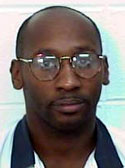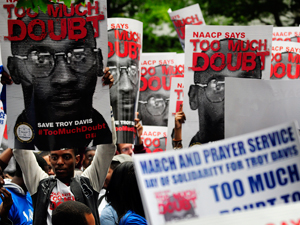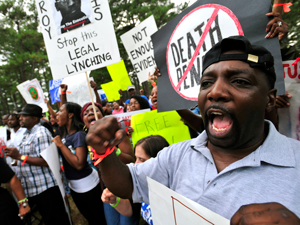Legal Lynching in Georgia?
By Jesse Muhammad -Staff writer- | Last updated: Sep 28, 2011 - 11:35:50 AMWhat's your opinion on this article?
After execution of Troy Davis, supporters and family vow to fight death penalty

|
“We're hurting and we thank everyone for everything they did. Like my brother said this struggle didn't start with him and it shouldn't end with him. We can't stop. His death was not in vain. He told us he wants us to keep fighting to prove his innocence and that's what we're going to do,” Martina Correia, his elder sister, told The Final Call in a phone interview on Sept. 22.
“We must abolish the death penalty. It's time for the old South to change and its time for us to pressure these apathetic Black officials who keep allowing injustices like this to keep happen. This movement isn't over,” said Ms. Correia.
On September 21, at 11:08 p.m. Eastern Standard Time, Mr. Davis was pronounced dead—some say murdered—by lethal injection in Jackson, Georgia.
Ms. Correia said she and her family spent at least six hours visiting with her brother the morning of the execution. “We did not witness the execution,” she said.

Marchers gather in downtown Atlanta to walk from Woodruff Park to Ebenezer Baptist Church, the spiritual home of the Rev. Martin Luther King Jr., in support of Georgia death row inmate Troy Davis.
|
According to U.S. media representatives who witnessed the execution, Mr. Davis used his last words to continue declaring his innocence.
“I am innocent. The incident that happened that night was not my fault. “I personally did not have a gun. I was not the one who took the life of your father, son, brother,” said Mr. Davis while strapped to the gurney and needles being injected into his arm.
To the prison officials, Mr. Davis said, “For those about to take my life, may God have mercy on your souls. May God bless your souls.”
“Every life is precious with Allah, the life of the policeman that was killed and the life of Troy Davis,” said the Honorable Minister Louis Farrakhan of the Nation of Islam, in a statement released hours before the execution took place.
“The arrogance of authority to not fiercely fight for the truth that may exonerate him is dangerous for the state of Georgia. When Cain slew his brother Abel, God told him that the blood of your brother cries out from the ground for justice. If our brother is killed, and he is innocent, I feel sad for the state of Georgia for the God of Justice will retaliate,” warned Min. Farrakhan.
It was a gruesome ending to a case that has widened the conflagration of global disgust with the death penalty, America's flawed justice system, and the continuous miscarriages in the fair administration of laws meant to protect its citizens.
“We need a nationwide ban on the death penalty. If we can't be certain of the legitimacy of the conviction, the practice must be halted. It is criminal that this man was executed with so much doubt surrounding his case and Georgia has blood on its hands,” said Judge Greg Mathis, who hosts a popular TV court show and actually served on the bench in Michigan.
“I don't like to contradict other judges, but Davis should have been granted a new trial so that he could prove his innocence. This was, without a doubt, a grave miscarriage of justice,” he added.
“The night they put Troy Davis to death will become an annual reminder that justice will not be achieved until we end this brutal practice of capital punishment,” said Ben Jealous, CEO and president of the NAACP.
“We must not only mourn what happened to Troy Davis but take strong measures so that it does happen again,” said Reverend Al Sharpton of the National Action Network. “I promised Troy when I got involved in this case in 2007 that NAN and I no matter what the outcome would fight to change the law.”
“My heart is heavy. I am sad and angry. The state of Georgia has proven what we already know. Governments cannot be trusted with the awful power over life and death,” said Laura Moye, Director of the Death Penalty Abolition Campaign of Amnesty International USA.
Amnesty International, along with the NAACP and other groups, was instrumental in gathering over one million signed petitions calling for clemency.
“Today, Georgia didn't just kill Troy Davis, they killed the faith and confidence that many Georgians, Americans and Troy Davis supporters worldwideused to havein our criminal justice system,” said Ms. Moye.
The flaws of America's justice system further exposed

Protesters chant anti-death penalty slogans for Georgia death row inmate Troy Davis In Jackson, Ga., Sept. 21. Photos: AP/Wide World photos
|
Eyewitnesses originally claimed Mr. Davis and two other men were harassing a homeless man in 1989 in a Burger King parking lot. Mr. MacPhail, who was off duty, arrived on the scene to aid the man and witnesses testified at trial that Mr. Davis shot the officer twice before escaping the scene.
Seven out of the nine witnesses against him eventually recanted their testimony, no murder weapon was found and no physical evidence was presented that linked Mr. Davis to the crime. Yet he was still put to death.
“We've long known our justice system is broken. Davis' execution shows us just how flawed the system has become. Too often prosecutors and parole boards simply refuse to admit they are wrong or have doubts about the guilt of the accused. Our nation's governors are often unwilling to sacrifice their political careers in the name of doing the right thing,” said Judge Mathis.
On Sept. 23, Rev. Sharpton, who also joined the protest outside the Jackson prison, traveled to Washington, D.C., to call upon the U.S. Justice Department to move out on federal laws that would prevent states from prosecuting capital cases unless scientific or physical evidence is presented in the case.
“We are calling upon the federal government to supercede and set boundaries before any state can move forward with capital punishment prosecution. Multiple studies have established how flawed eyewitness testimony is and 75 percent of the cases overturned by DNA evidence were cases that also had flawed eyewitness testimony,” said Rev. Sharpton.
“We must not allow prosecutors to convict an individual based solely on eyewitness testimony when new evidence is introduced or witnesses recant their testimony. A new trial should automatically be granted when this occurs,” advised Judge Mathis.
According to the most recent statistics released by the Death Penalty Information Center (DPIC), there have been 1270 executions in the U.S. since capital punishment was reinstated in 1976.
Whites and Blacks have accounted for 56 percent (712) and 34 percent (441) of those executions, respectively. Over 82 percent (1,043) of those executions have been carried out in the South.
The DPIC reports that 34 states have the death penalty. Texas has the most executions with 475 since 1976, including 11 so far this year. The Lone Star State is followed by Virginia (109) and Oklahoma (96). Georgia ranks 7th with 52 executions carried out.
Over 75 percent of the murder victims in cases resulting in an execution were White, even though nationally only 50 percent of murder victims generally are White, according to the DPIC. A 2009 poll by DPIC revealed police chiefs ranked the death penalty last on the list among ways to reduce violent crime.
“The world will remember Troy's name, as death penalty opponents who remained silent in the past realize that their silence is no longer an option. Our movement will grow stronger until we succeed in destroying the death penalty in the United States once and for all,” said Mr. Jealous.
College students arrested; hip-hop makes a statement
People held rallies, protests, and prayer vigils on the night of Mr. Davis' execution. Twitter and Facebook were flooded with people sharing phone numbers and e-mail accounts for Georgia officials who had the authority to withdraw the death warrant.
Big Boi, one half of the Atlanta rap group OutKast, flooded his Twitter followers with up-to-the-minute updates for several days. He also led a caravan of protesters who stood outside the Jackson prison.
“Just remember we fought til the very end .... peace and Blessings,” Big Boi tweeted after Mr. Davis was executed. “Dear Georgia, we don't know if Troy Davis killed a man. Neither do you. But we know you killed Troy Davis.”
Hip-hop mogul Russell Simmons was also vocal about the case. “I think executions should be broadcast live on television. Let us see the barbarianism that we've sanctioned. We have to talk about the disparities between black and white in death penalty, kill a white and u are 10 times more likely to fry,” he tweeted.
“I believe the death penalty should be abolished. I don't think this country is in any position to hold its citizen's lives in their hand. There has not been justice for Black people in this court system,” Dream Hampton, a noted writer and member of the Malcolm X Grassroots Movement, told The Final Call.
“We all wanted to do something. I think that those signatures and the phone calls is a way of creating a record that people said this is not done in my name and I didn't sit idly by. We're resisting. One must resist oppression on all levels. We need that on record for our children,” said Ms. Hampton, who also tweeted ways people can stay involved.
“We have some responsibility that if we're going to lead people into action, if that action is a ‘failure,' then we have to give them some alternatives to do something with that energy and continue struggling,” she added.
Howard University students protested at the Supreme Court and some were arrested for marching outside the White House lawn.
“We were protesting peacefully for Troy Davis in front of the White House and the officers asked us to move. A few of us refused, sat down and locked arms,” Jalisa Goodwin, 21, told The Final Call. She serves as president of Ubiquity, Inc.
Ms. Goodwin, a junior English and African-American studies major, said officers gave them three warnings. She was among the 12 Howard students and one professor who refused to move and were arrested on Sept 21. She said they were all given a $100 fine and the community is raising funds to pay the fees in support of their stance.
“I was disheartened by the execution. And at the same time I felt empowered that we had took a stand. I prayed that we as students can learn from this and use this time to organize ourselves, get more involved and fight to make change,” said Ms. Goodwin.
The funeral for Troy Davis is scheduled to take place on Saturday, October 1 at Jonesville Baptist Church in Savannah, Georgia.
Related news:
Minister Farrakhan statement on Troy Davis execution (FCN, 09-21-2011)
State of Georgia Killing An Innocent Man? (FCN, 09-21-2011)
Supreme Court rejects appeal of death row inmate Troy Davis (FCN, 04-17-2011)
Fight of lifetime for Troy Davis (FCN, 11-04-2008)
Neo-slavery rises in Georgia's criminal justice system? (FCN, 06-30-2011)
American Jim Crow injustice in the state of Georgia (FCN, 07-01-2007)
Justice for Kenneth Walker: Brutally shot down by Georgia police (FCN,01-26-2005)
INSIDE STORIES AND REVIEWS
-
-
About Harriett ... and the Negro Hollywood Road Show
By Rabiah Muhammad, Guest Columnist » Full Story -
Skepticism greets Jay-Z, NFL talk of inspiring change
By Bryan 18X Crawford and Richard B. Muhammad The Final Call Newspaper @TheFinalCall » Full Story -
The painful problem of Black girls and suicide
By Charlene Muhammad -National Correspondent- » Full Story -
Exploitation of Innocence - Report: Perceptions, policies hurting Black girls
By Charlene Muhammad -National Correspondent- » Full Story -
Big Ballin: Big ideas fuel a father’s Big Baller Brand and brash business sense
By Bryan Crawford -Contributing Writer- » Full Story






 Click Here Stay Connected!
Click Here Stay Connected!








